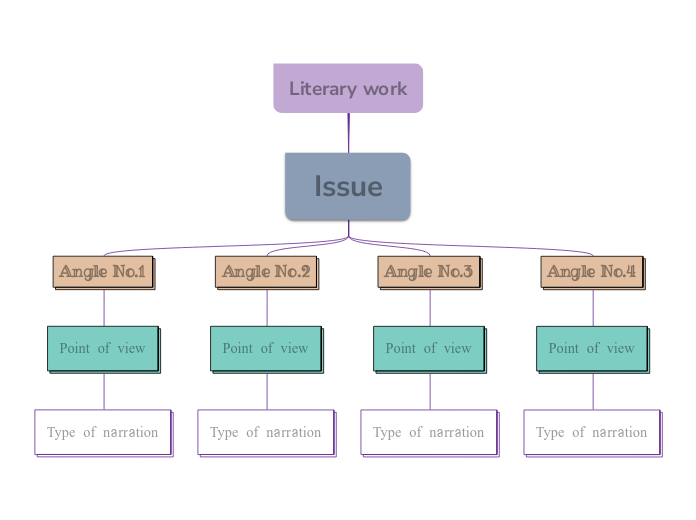Narrative Points of View
This mind map will help you discover the multiple perspectives from which you can analyze an issue from your literary work.
Keywords: literature, writing


Honelako gehiago
Identifying multiple author’s perspectives can be difficult if you do not organize your ideas. Use this mind map template to look at an issue from four different angles.
Type in the name of the multiple-perspectives text.
Example: Bridge to Terabithia by Katherine Paterson
Identify an important issue from the text that is being presented from different angles. Type it in.
Example: Jesse's drawing talent.
Decide on the fourth point of view
Type in the name of the last character whose perspective on the issue you are going to present.
Example: Leslie Burke, Jesse's new next-door neighbor, and best friend.
Point of view
Type in a relevant quote that highlights the character's point of view. Try to follow a citation format: author's name, chapter, and page.
Example: I can't get the poetry of the trees,' he said. She nodded. Don't worry,' she said. You will someday. He believed her.' (Paterson, 4. 24)
How is the viewpoint introduced in the story?
Choose an answer:
Whose character does the third point of view belong to?
Type in his/her name.
Example: Mr. Aarons, Jesse's father.
What does the character think, say or do that suggests their perspective on the issue?
Type in a quote and try to maintain the citation format.
Example: 'He would like to show his drawings to his dad, but he didn't dare. (...) He'd thought his dad would be pleased. He wasn't. What are they teaching in that damn school? he had asked.' (Paterson, 2.8)
What kind of narration introduces the viewpoint?
Choose an answer:
Decide on the second point of view
Name the character (it can either be the main character or one of the supporting characters) whose point of view you are presenting.
Example: Miss Edmunds, Jesse's music teacher.
Type in a quote that points out the character's position about the issue.
Try to follow a citation format: author's name, chapter, and page.
Example: 'She said he was unusually talented, and she hoped he wouldn't let anything discourage him.' (Paterson, 2. 8)
How is the viewpoint introduced in the story?
Choose an answer:
Decide on the first point of view you are going to present.
Type in the name of the character (it can either be the main character or one of the supporting characters) whose point of view belongs to.
Example: Jesse Oliver Aarons, Jr., the main character of the novel, a fifth-grader living in a rural Southern area.
Type in a relevant quote that highlights the character's point of view towards
Issue.
Try following a citation format: author's name, chapter, and page.
Example: 'Jesse drew the way some people drank whiskey. (...) Lord, he loved to draw. (...) When he was in first grade, he told his father that he wanted to be an artist when he grew up.' (Paterson, 2. 7)
Type of narration
What type of narration introduces the viewpoint?
Choose an answer:
Buru-mapenek ideiak egiten laguntzen dute, kontzeptuen arteko harremanak ezartzen, ideiak antolatzen eta sortzen.
Hala ere, buru-mapen txantiloiak hasteko modu errazagoa eskaintzen dute, irakasgai zehatz bati buruzko informazioa duten markoak baitira jarraibide orientatzaileak. Funtsean, buru-mapen txantiloiak irakasgai zehatz baten elementu guztiak batzen dituen egitura bermatzen du eta zure buru-mapa pertsonalerako abiapuntu gisa balio du. Gai jakin bati buruzko mapa mentala sortzeko irtenbide praktikoa emateko baliabideak dira, bai negozioetarako, bai hezkuntzarako.
Mindomok esfortzurik gabe funtzionatzeko eta pentsatzeko aukera ematen duten buru-mapen txantiloi adimendunak eskaintzen dizkizu.
Gai deskribatzaileak
Hondoko testua duten gaiak
Adar lehenetsia
Txantiloiaren datuak kentzea
Mindomoren negozio- edo hezkuntza-kontuetako buru-mapen txantiloietatik aukera dezakezu, edo zure buru-mapa txantiloiak sor ditzakezu hutsetik. Edozein buru-mapa adimen-mapa txantiloi-mapa bihur daiteke bere gaietako bati gida-ohar gehiago gehituz.